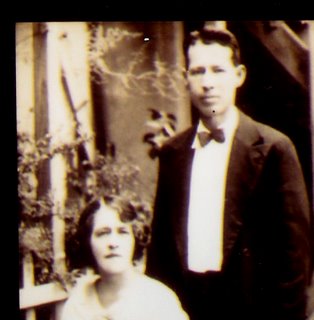Catalina (Perrotin) Huesca (1893 - 1998)
"Grandmas hold our tiny hands for just a little while, but our hearts forever." - Author unknown
 |
| My grandmother, Catalina (Perrotin) Huesca, Chicago, about 64 years old, 1956. |
We had moved to Mexico City in early 1964, and we stayed with her at her home for a couple of months while my parents, Gilbert and Joan (Schiavon) Huesca, looked for a suitable home.
Despite her limited space, Abuelita made us feel welcome and right at home. Her English was no longer what it had been when she spoke it at home with her parents, Francisco and Maria (Amaro) Perrotin, but she still understood it fairly well. She hugged and kissed us tenderly and laughed along with us as we sat in her tiny painted wooden chairs.
We could not have been happier to have so much attention. I think we somehow figured out in our own childish way that a grandmother's love knows no language barriers.
My parents and my two youngest sisters slept in the living room. I thought my other sister and I were the lucky ones when we found out we would get to sleep with our grandmother in her large, soft bed.
She was deeply religious. Wrapped in her black rebozo, or shawl over a soft flannel nightgown and wearing thick dark socks to keep her legs and feet warm, she tucked us gently into bed, turned off the main light, and lit a couple of candles in tall red glass jars covered with images of the Sacred Heart and Saint Michael the Archangel.
The candles now being the only light in the room, she knelt at her bedside and recited the Rosary. This was followed by various prayers, first to the Sacred Heart of Jesus, then to Virgin of Guadalupe, and lastly to Saint Martin de Porres, her favorite saint. Walking purposefully around the room, she stopped at each photograph and reverently lit the votive candles in front of them. The pictures were beautiful and numerous; they covered all the walls of her room, her two dressers, and the bedside tables.
She prayed for the people in each of the pictures: her parents and grandparents, her beloved husband Cayetano, their children and grandchildren, and her beloved sister Blanca Perrotin. She seemed to leave no one out, even though ours was a large extended family.
About 30 - 45 minutes later, Abuelita climbed into bed with us. I think she was surprised I was still awake, especially after our long journey, but I could not take my eyes off her. The toasty warmth of the tin heater in the corner, the flickering candles in the room and the dancing shadows on the wall, together with the family pictures and the images of God and all the saints smiling down on us made me feel safe and loved and blessed. I had never witnessed anyone talk to God as intimately before this night. We pulled the covers way up to our foreheads and cuddled together in the soft glow as we fell asleep, my grandmother stroking my head.
Copyright © 2013 Linda Huesca Tully

,+Oirzaba,+Veracruz.jpg)









